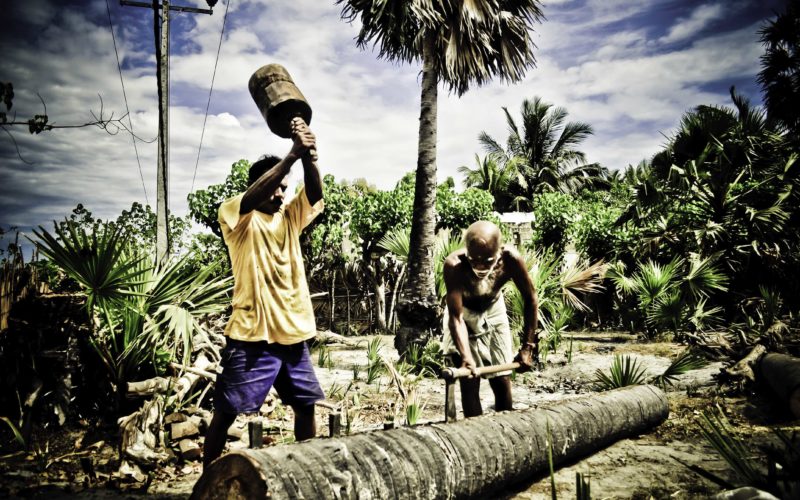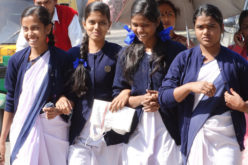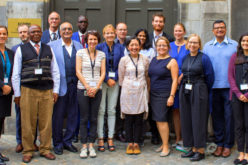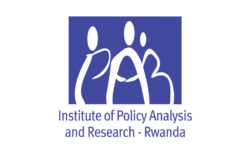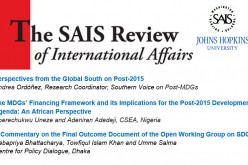Six research projects were chosen for the first “Southern Voice on the State of the Sustainable Development Goals” (SVSS) report.
Today we present the proposed research by the Centre for Poverty Analysis (CEPA), Sri Lanka, titled: “Repositioning Labour in a Rapidly Changing World”
Southern Voice: What is your SVSS research topic on and why did you choose it?
CEPA: Our study seeks to explore how labour, in particular how low skilled labour, can be marginalised within the global system due to automation. It also analyses if developing countries are preparing for this shift.
There is a growing trend in global literature focusing on the shift of labour towards automation and the rise of different work models. The global economy itself is shifting: from services to a knowledge-based economy. This raises concerns regarding increasing precariousness of labour, and the question of who will be “left behind” in this ‘shift’. There is a particular concern regarding those who find themselves in the situation of forced or involuntary precariousness. These “trends” are taking place in parallel to the Sustainable Development Goals (SDGs) that are demanding better conditions and protection of marginalised workers. Thus, it is important to identify how sustainable labour is constituted within SDG 8 (decent work and economic growth) and the core idea of Leave No One Behind (LNOB).
There are two ways in which the idea of Sustainable Labour is approached in research literature:
- According to the International Labour Organisations(ILO), a decent job is understood as labour that provides a secure and sustainable lifestyle. That means, whether it is positioned as integral to the functioning of the economy, and whether it is fundamentally anchored to the subjective well-being of the worker. It aspires to be a system that is inclusive and productive, oriented towards healthy working conditions and the right match between job offers and the supply of suitably skilled workers.
- Another way to engage with the ‘sustainability’ of labour is to consider what it constitutes from the perspective of a green economy. In fact, labour conceived from an environmentally sustainable angle is meant to transform conventional industries and guide such industries towards more automation. This then leads to less waste and is more energy efficient. A green job is also considered a decent It is less concerned with actual labour value and cares more about environmental sustainability.
In both these forms of understanding labour, job losses due to automation or how this may take place and who is likely to get left behind is not factored in. That is why we think it is useful to examine how labour, aligned to sustainable criteria, will match up against the global trends of automation.
SV: What do you expect the contribution of the research to be on the SDGs you chose?
CEPA: This study focuses mainly on low skilled labour and therefore on SDG 8. But it recognises the interlinkages of other SDGs and their three domains: the economic, social and environmental one. We aim to provide a narrative of the synergies and trade offs that take place between these multi dimensional aspects and how low skilled labour is impacted by a global process such as automation. And as employment is related to education, the fate of low skilled workers will be analysed in the context of the type, quality and access to education. This relates to Goal 4 (quality education). Equality of employment conditions and opportunity for women are also important features, related to Goal 5 (gender equality). Our definition of sustainable labour also incorporates environmental sustainability and therefore will link to SDG 12 (responsible consumption and production). These SDGs are reflected in the indicators used for the data collection process at every stage.
SV: How do you expect the results of your research to influence the discussion in your country on the SDGs of your project?
CEPA: The study hopes to influence how Sri Lanka responds to the changes occurring globally in the knowledge economy. It will also look at how it will impact poor/low skilled workers. Precariousness of work is already evident in highly vulnerable sectors, such as agriculture. It is now moving into more formal sector jobs. The preference for jobs is also changing. So if Sri Lanka aims to safeguard decent work for all, we need to better understand what is changing and what types of workers would be marginalised by global trends.
This study looks at a sector and a workforce that is of fundamental importance to Sri Lanka’s economy. By looking at how it is adapting, we would be able to provide an insight into the synergies and trade offs. This in turn can help create policy coherence and integration.
About the SVSS project
The Southern Voice “State of the SDGs” initiative will provide evidence-based analysis and recommendations to improve the delivery of the Sustainable Development Goals (SDGs). As a collaborative initiative, the program will compile a broad range of perspectives that are usually missing from international debates. The aim of this report is to fill an existing knowledge gap. Southern Voice is confident that it will enrich the discussions on the SDGs and level the playfield with new voices from the Global South.
About CEPA:
 The Centre for Poverty Analysis (CEPA) is an independent, Sri Lankan think-tank. It promotes a better understanding of poverty-related development issues. CEPA strives to contribute to influencing poverty-related development policy, at national, regional, sectoral, programme and project levels. CEPA carries out a range of client in the thematic areas of infrastructure, migration, environment, conflict and vulnerability. CEPA currently serves as the regional coordinator for the Southern Voice network.
The Centre for Poverty Analysis (CEPA) is an independent, Sri Lankan think-tank. It promotes a better understanding of poverty-related development issues. CEPA strives to contribute to influencing poverty-related development policy, at national, regional, sectoral, programme and project levels. CEPA carries out a range of client in the thematic areas of infrastructure, migration, environment, conflict and vulnerability. CEPA currently serves as the regional coordinator for the Southern Voice network.
1,850 total views, 2 views today


